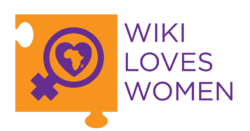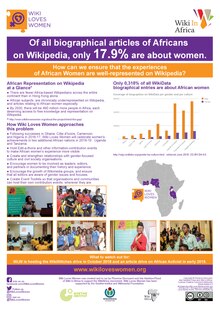Wikipedia:WikiProject Wiki Loves Women/Intro

Wiki Loves Women Introduction
Wiki Loves Women focuses on bridging two significant gaps on Wikimedia projects – women and Africa – both in terms of content about these subjects and in terms of participation by people from these groups.
The project is designed to leverage Wikipedia’s role as a global repository for the dissemination of information to achieve accessible and fair online representation of notable women in countries in Africa. It encourages the contribution of existing researched and verified information by civil society organisations to Wikipedia with the intent of redressing the systemic bias online about women. The donated data and content specifically focuses on women’s contribution to the political, economic, scientific, cultural and heritage landscape, as well as the current socio-political status of women in each country that it is instigated.
In 2020, Wiki Loves Women announced it's Advisory Committee that is made up of amazing women and men within the Wikimedia movement who have experience with pushing for gender equity. Many of the members were involved as their community's leads when doing Wiki Loves Women's activities in their countries. We are fortunate and honoured to have them involved.
The project achieves its aims by working with existing gender equality-focused civil society organisations to release their intelligence onto Wikipedia, and by training established Women’s groups and working with existing Wikipedia Volunteer groups to disseminate this information among the Wikimedia projects. In addition, the project encourages the activation and support of new and existing editors (both female and gender-sensitised male Wikipedians) in the focus countries.
Did you know that only 0.318% of all Wikidata biographical entries are about African women? Furthermore, of all biographies about African people on Wikipedia, only 17.9% are about women.
African Representation on Wikipedia at a Glance
- There are fewer Africa-based Wikipedians across the entire continent than in Hong Kong alone.
- African subjects are chronically underrepresented on Wikipedia, and articles relating to African women especially.
- By 2030, there will be 490 million more people in Africa, each deserving access to free knowledge and representation on Wikipedia.
Freeing access to information on African women

WikiProject Wiki Loves Women seeks to fill two major subject gaps – women and Africa – on the free encyclopaedia Wikipedia. These gaps exist both in content on these two themes, but also in terms of participation in the editorial level. Our objective is the fight against the existing inequalities between men and women on the African continent.
How will Wiki Loves Women approach this problem?
- Following successes in Ghana, Cote d’Ivoire, Cameroon, and Nigeria, Wiki Loves Women will celebrate women’s achievements in two new African nations: Uganda and Tanzania.
- Hold Edit-a-thons and other information-contribution events to make African women’s experience more visible.
- Create and strengthen relationships between gender-focused culture and civil society organisations.
- Encourage women to be involved as leaders, editors, and partners in documenting their history and experience.
- Encourage the growth of Wikimedia groups, and ensure that all editors are aware of gender issues and focuses.
The Wiki Loves Women project aims to release and make widely available cultural and educational content on, or related to women, to the general public. The project works with organisations and public institutions to draw their existing information onto Wikipedia, and via this platform be made available to millions of people every day. The Wiki Loves Women project is organized by Wiki In Africa in two countries (Tanzania and Uganda) and supported by Wikimedia Foundation. In 2016-2017 the project was run in collaboration with the Goethe Institute and was active on the ground in four West African countries: Côte d'Ivoire, Ghana, Cameroon and Nigeria.
More info on
- Our website : http://www.wikiloveswomen.org
- On Facebook page (public) : https://www.facebook.com/WikiLovesWomen/
- On Facebook group (restricted access)
- On Twitter : http://www.twitter.com/wikiloveswomen
